Dogville

On paper, Dogville is a film I should be loathing. Set in small village in last-century USA, lacking in visual splendour, three hours long and bursting with plot and subtext, it's a near-exhaustive checklist of things I usually don't care for in films. And yet, in some weird, slightly confusing way, von Trier delivered a film that sucked me in regardless. Watching it again, I have to say that it lost a sliver of its original impact, but all in all it remains a unique, strong and impressive piece of cinema.

There's only one thing Lars von Trier likes better than making rules, and that's breaking rules. After stirring up a big fuzz with his Dogme '95 movement, he threw out his 10-rule Dogme guidebook and started over from scratch. Dogville is his first post-Dogme film and while not everyone was equally conscious of this sudden change in approach (I remember back then some people still considered Dogville to be a Dogme film) the contrast with his earlier films couldn't be any bigger.
Dogville is extremely stylized, though in a very minimalistic way. Don't expect meticulous camera work, heaps of post-production tinkering or elaborate setups (though on a purely technical level there are a couple of remarkable shots), but realism this clearly ain't. What von Trier did was strip away all the excess in search for a closer focus on characters and their emotions. The result is a film that is shot on a stage, with chalk outlines representing the town and its houses and just a minimum of on-stage props to ground the actors. A trick Miike would later repeat with 46-Okunen no Koi.
The story revolves around Grace, a runaway girl who one day arrives in Dogville, a small mountain village almost entirely cut off from the rest of the world. Tom, the town's self-proclaimed philosopher, covers for Grace when a gang of henchmen arrives in Grace's wake only moments later. The town grudgingly accepts Grace's presence, but quickly realizes that there are some welcome advantages in having her around. Tom tries to temper the opportunistic behavior of the townspeople, but can't prevent them from taking advantage of Grace's disposition.

Dogville's biggest differentiator is no doubt its appearance. To watch a 3-hour long film shot on a single stage, with some chalk lines marking the houses and a handful of props is something else. There are a few noticeable visual effects (like the overlaying shots when Grace hides in the truck), but also a few hidden technical feats. The opening shot for example is a composite of a total of 50 cameras, needed because von Trier's studio wasn't high enough to get the proper aerial view. I wouldn't call Dogville a visually striking film, but it's definitely unique and the extra abstraction does give it some extra flair.
The soundtrack is far less daring, which, come to think of it, is a little ironic. As much as von Trier likes experimenting when he's constructing his projects, he usually doesn't reach beyond a couple of popular classical music pieces when looking for music to go with his films. It's not that the soundtrack is bad or ill-fitting, but for someone who loves to tinker and experiment with the fabric of cinema, you might expect something more daring and challenging in the soundtrack department.
The casting too is a little on the safe side, although it must be said that Nicole Kidman probably wasn't the most obvious of choices. She plays one of the best parts of her career though, going through a couple of crude transitions in a frighteningly plausible way. With people like Philip Baker Hall, Paul Bettany and Stellan Skarsgard by her side she is surrounded by ample acting talent, but it's John Hurt as the film's narrator that leaves the biggest impression besides Kidman. His voice is one of the elements that defines Dogville.

While three hours may sound quite long, the film never really drags and the running time never feels drawn out or forced. Even though there isn't that much plot, the shifting relationship between Grace and the townspeople is interesting enough to follow as Dogville builds up to a more than gratifying finale. The final act is pretty harsh and may be seen as shocking (I've also seen it referenced as deplorable), but going through the film it feels like the only logical conclusion.
I never liked von Trier's Dogme obsession, as it largely contradicts my own views on cinema. Luckily the man suffers from a rather short attention span. For Dogville he turned things upside down and came with a film that feels very abstract and otherworldly, but in a very intimate and humanistic way. For that seemingly contradiction alone the film is worth watching. Add some great acting and a powerful finale and you have a small masterpiece. It may have lost a little of its shine since it first came out, but what remains is a solid film that will easily stand the test of time.